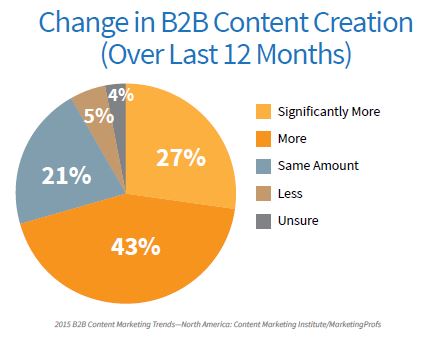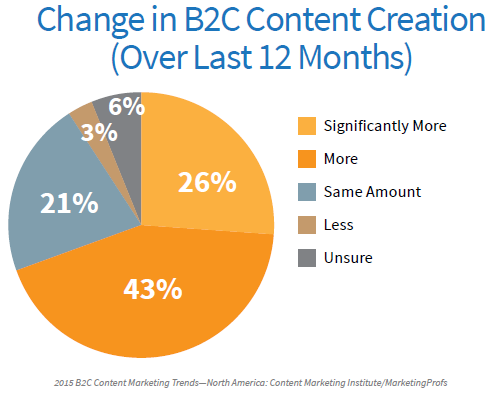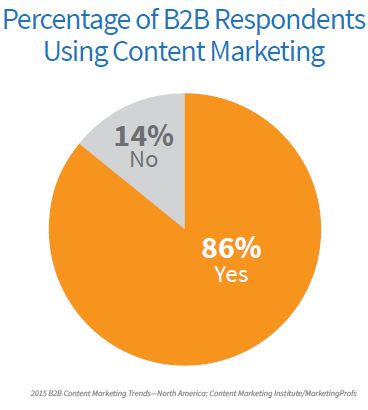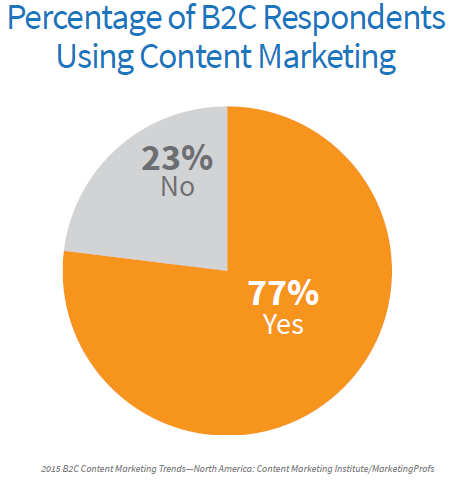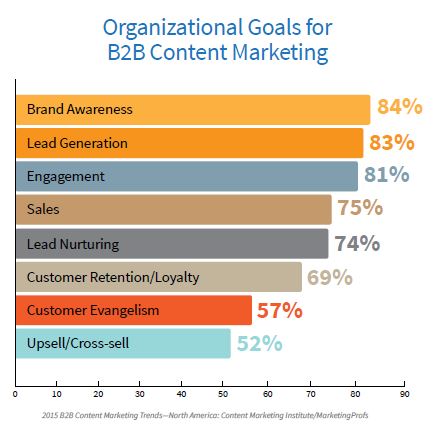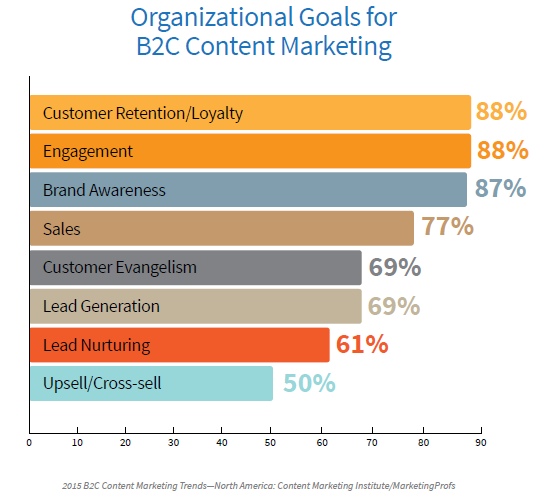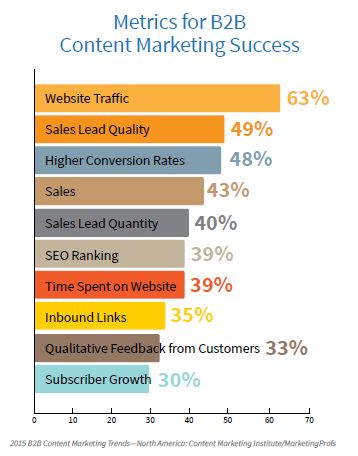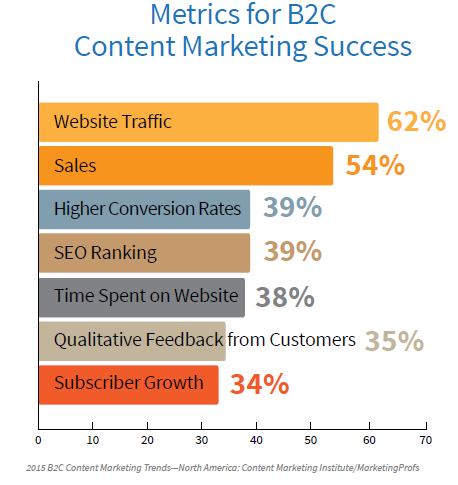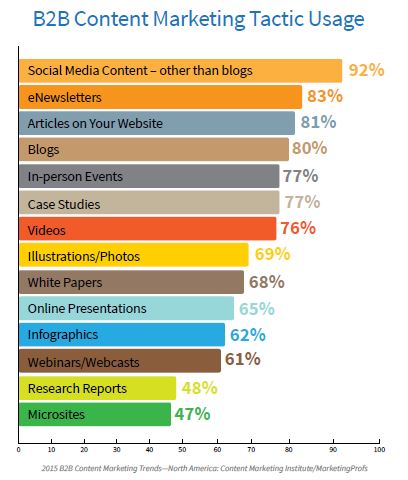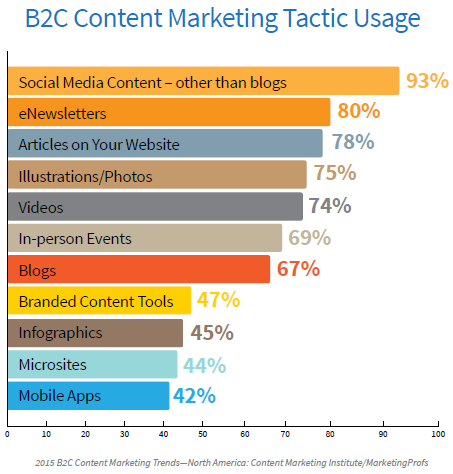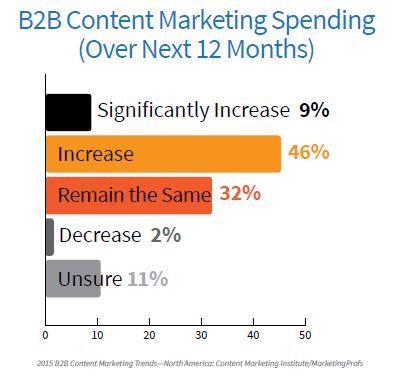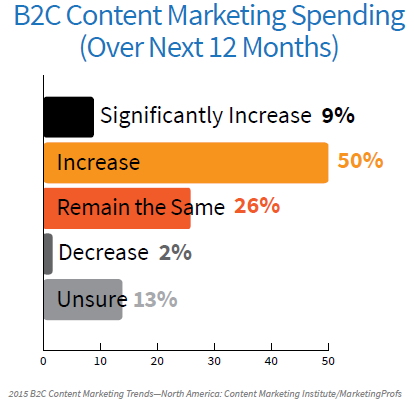The State of Content Marketing: An Overview of the Industry and Predictions for 2015
As traditional marketing is gradually eclipsed by new technologies, the rapid digitization of information, and changing consumer behaviors, more and more marketers are using content marketing to reach out to clearly defined audiences.
While previous years were concerned with mastering individual channels, identifying and connecting with the right audience, and creating cohesive content marketing strategies, 2015 will be dominated by the need to deliver a common brand experience, both online and offline. As consumers adopt an increasingly multi-platform approach to content consumption, marketers are challenged to create content that can be accessed across platforms, apps, and devices.
The State of Content Marketing among B2B and B2C Marketers
On the whole, studies reveal that marketers—both B2B and B2C—are producing more content than they did a year ago. According to the “B2B Content Marketing 2015: Benchmarks, Budgets, and Trends—North America” report (produced by the Content Marketing Institute and MarketingProfs), 70% of B2B marketers are creating more content than they did last year. This includes those who state they are least effective at content marketing (58%), and those who profess not to follow any kind of strategy (56%). [See Figure 1]
Meanwhile, according to the “B2C Content Marketing 2015: Benchmarks, Budgets, and Trends—North America” report, 69% of B2C marketers are creating more content than they did last year. This percentage, though, is slightly down from the previous year, “when 72% said they were creating more [content] (with 32% having said significantly more).” [See Figure 2]
Both of the aforementioned reports surveyed marketers from around the world, “representing a full range of industries, functional areas, and company sizes”, and was conducted between July and August 2014.
When it comes to the organizational use of content marketing, 86% of B2B marketers said their organizations use content marketing, which is slightly down from the previous year when 93% of respondents said they use content marketing in their organizations. [See Figure 3]
As for B2C marketers, 77% said their organizations use content marketing, which is a significant decline from the previous year when 90% of B2C marketers said they use content marketing. [See Figure 4]
The Content Marketing Institute and Marketing Profs have updated their definition of content marketing, and now define it as a “strategic marketing approach focused on creating and distributing valuable, relevant, and consistent content to attract and retain a clearly defined audience—and, ultimately, to drive profitable customer action.”
As for the effectiveness of content marketing campaigns, only a handful of B2B and B2C marketers rate their organizations as being effective at content marketing. (The studies define effectiveness as “accomplishing your overall objectives”.) Only 8% of B2B marketers rate their organizations as being “very effective’ at content marketing, and 30% rate their organizations as being “effective”. Almost half of B2B marketers (42%) were neutral, which suggests that such marketers lack the objective means to measure performance.
Rather similarly, only 8% of B2C marketers rate their organizations as being “very effective” at content marketing, and 29% rate their organizations as being “effective”. 36% of B2C marketers were neutral.
Organizational Goals, Measuring Performance, and Strategies
The studies revealed different organizational goals for B2B and B2C marketers. Brand awareness topped the list of organizational goals for B2B content marketers, with 84% of B2B marketers rating it as “very important.” Brand awareness has been consistently ranked as the top goal of B2B marketers for the last five years. [See Figure 5]
As for B2C content marketers, multiple goals are rated as being “equally important”. Both customer retention/loyalty and engagement are rated as being “very important” at 88%. Meanwhile, 87% of B2C marketers rate brand awareness as being “very important” to “important”. [See Figure 6]
More than half of surveyed B2B marketers (63%) use website traffic to measure the impact of their content marketing strategy. “B2B marketers consistently cite website traffic year-over-year as the metric they look to most often—regardless of company size, effectiveness, or whether or not they have a documented strategy.” [See Figure 7]
Quite similarly, more than half of surveyed B2C marketers (62%) use website traffic to measure the impact of their content marketing strategy. [See Figure 8]
B2B marketers use an average of 13 content marketing strategies in their campaigns. Social media content (other than blogs) is the most used tactic (92%); followed by eNewsletters (83%), articles on the marketer’s website (81%), and blogs (80%). [See Figure 9]
B2C marketers, meanwhile, use an average of 11 content marketing strategies in their campaigns. Social media content (other than blogs) is the most used tactic (93%); followed by eNewsletters (80%), articles on the marketer’s website (78%), and illustrations/photos (75%). [See Figure 10]
B2B and B2C Content Marketing Expenditure over the Next 12 Months
55% of surveyed B2B marketers said they will increase their organization’s content marketing budget over the next 12 months. This includes the 54% that state they are the least effective at content marketing. [See Figure 11]
Meanwhile, 59% of surveyed B2C marketers said they will increase their organization’s content marketing budget over the next 12 months. This is a slight drop from last year when 60% of B2C marketers stated they would increase their spending.
While 55% of the most effective B2C marketers plan to increase their spending, 61% of the least effective B2C marketers plan to increase their content marketing budget over the next 12 months. [See Figure 12]
Both B2B and B2C Marketers Want Better Metrics and ROI Tracking
When asked what area of content marketing they wanted to learn more about, a plurality of B2B marketers said they wanted more information about metrics; as well as achieving, tracking, and demonstrating ROI. A plurality of B2C marketers said they also wanted more information about achieving, tracking, and demonstrating ROI.
Marketers wanted to learn more about content discovery tools, marketing automation, and lead generation/nurturing, among others. These two studies clearly indicate that marketers want to measure the performance and profitability of their content marketing endeavors. Many of these organizations are willing to invest in more expertise, technologies, and systems to gain an edge over their competitors. They also want to attract clearly defined audiences, and ultimately, drive profitable customer action.
The Top Content Marketing Predictions for 2015 from Top Industry Minds
The top industry minds have shared their content marketing predictions for 2015, which can help B2B and B2C content marketers plan their strategies for the coming year.
During the Contently Summit, which was held in November 2014, Camille Padilla Dalmau, a writer and multimedia producer at Contently, asked the top minds in the industry about their content marketing predictions for 2015.
Audrey Gray (AVP, Lead Communications Strategist, Global Tech & Operations at MetLife), predicted that content marketers will be adopting content performance metrics that align to very specific business goals beyond brand awareness—a sentiment reflected in the studies released by Content Marketing Institute and MarketingProfs.
Chad Mumm (Creative Director at Vox Media, Inc.), predicted that platform agnostic content will become more widespread in 2015. Such content will be increasingly designed to extend to different platforms. “In some cases, it could be adapting content, and in others, it could be creating new content for a specific platform,” observed Mumm.
Josh Porter (AVP, Digital Marketing Manager at Bank of America Merrill Lynch), predicts that visual content, such as infographics, will be more prominent in 2015. Moreover, there will be less emphasis on longform content, and more emphasis on short stories and bite-sized content.
These trends coincide with the release of new media features on micro-blogging sites like Twitter, which now hosts the ability to capture, edit, and share videos from within the Twitter app. Twitter now hosts rich multimedia in the form of compelling images, GIFs, Vines, audio files, and videos—all within the confines of Tweets 140-characters long.
As the attention spans of audiences continue to shorten, and more media is released to attract their attention, brands and content marketers will be challenged to create bite-sized content that engages their target audience, as well as meets their marketing objectives.
Most revealingly, Helen Mussard (Vice President, Global Marketing at Vibrant), predicted that marketers will be challenged to create content that responds to real-time events. While creating and sticking to editorial calendars will continue to remain important, there will be increasing “focus on things that break and are topical.”
Other predictions can be found in Dalmau’s article.
When area(s) of content marketing does your organization want to learn more about? What are your content marketing predictions for 2015?
Marketing Digest Writing Team
Latest posts by Marketing Digest Writing Team (see all)
- How Taco Bell Struck Gold with Its Memorable Viral Marketing Campaigns - September 15, 2015
- Salesforce Marketing Cloud Releases New Instagram Marketing Tools - September 12, 2015
- Chrome Begins Pausing Flash Ads by Default to Improve User Experience - September 3, 2015


